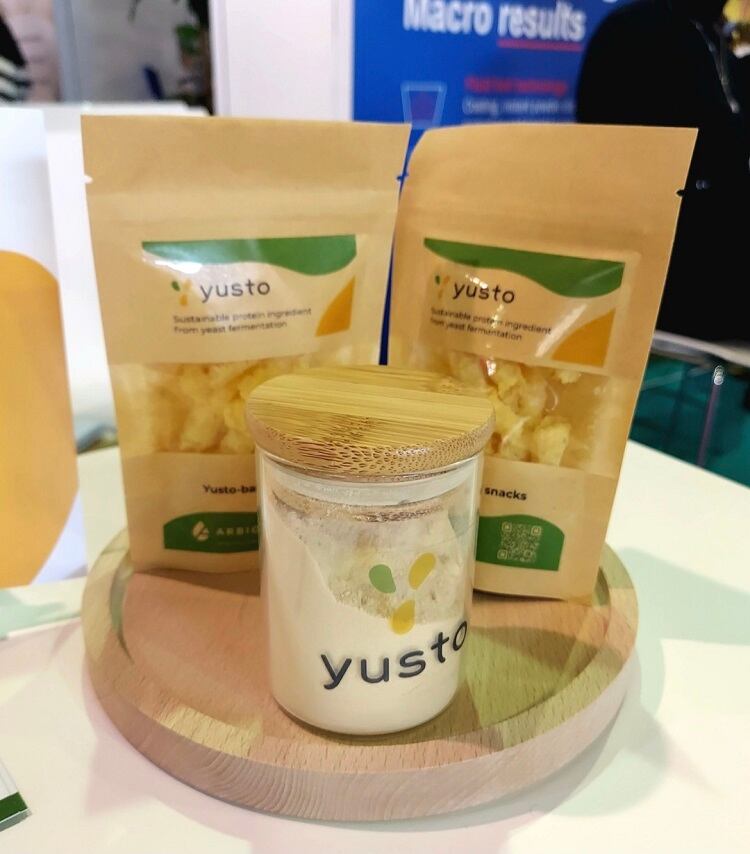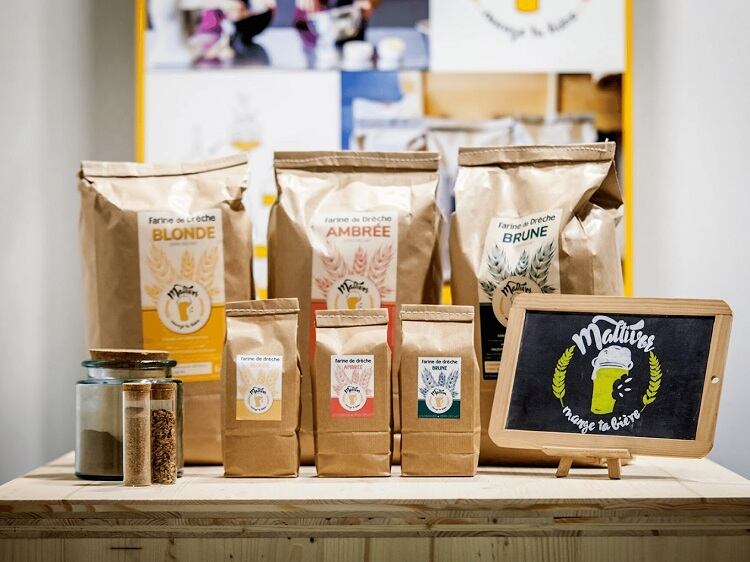After three days, 23 cups of coffee, and a squillon steps, our time at Messe Frankfurt for Food Ingredients Europe (FiE) 2023 has come to a close.
FoodNavigator was roaming the show floor, noting eye-catching innovations from an exciting cohort of newcomers. From umami flavouring made from split peas to herbal medicine-derived functional ingredients, we’ve rounded up the B2B solutions that stood out from the crowd.
Bringing botanicals to functional foods
Consumers are increasingly suffering from pill fatigue, according to co-founders of Israeli start-up SolvEat.
We met Zacki Nudelman and Udi Peretz (chief business officer and CEO respectively) at the Start-up Pavilion, where they explained an obvious solution to taking too many supplements lies in functional food.
SolvEat is working with herbal ingredients designed to target ‘high impact’ health conditions. Its first indication is for prediabetics and health-conscious consumers, explained Nudelman. In an ‘East meets West’ approach, the start-up is extracting properties from these herbs that help to maintain healthy blood sugar levels.
But these ‘powerful extracts’ do not have a pleasant taste. The company is therefore working with food delivery technology in the form of microencapsulation. This technique masks the bitter taste of the ingredients, while improving stability and bioavailability.

The first prototype developed is chocolate: a sugar-free offering that prevents sugar spikes. Eight different herbs are used, ranging from golden thread to Chinese foxglove and Hawthorn Berries. “It’s a plug and play solution. You can use it in different foods and beverages,” Nudelman explained.
The next indication in SolvEat’s pipeline is immunity, for which scientific research is already underway.
Yeast-based protein for food and feed
The last time FoodNavigator spoke with Arbiom, the Franco-American start-up was working with yeast to develop animal feed. Branded SylPro, the ingredient is made from fermented yeast and side streams from the forestry industry.
But speaking with Amélie Drouault, Arbiom’s VP business development at FiE, we learnt that the

start-up has developed an ingredient for the food industry.
Yusto is made from yeast, which undergoes a biomass fermentation process. Different carbon sources can be used, the business development lead explained. Once the biomass is separated into liquid and solid matter, it is dried to form a powder.
The ingredient contains around 55% protein and is targeting food makers looking for wellbeing, taste, and quality properties. Yusto presents with an umami flavor, Drouault explained. It can help mask the taste of plant proteins and play a role in salt reduction.
Other benefits include its beta-glucan content for gut health and its anti-inflammatory properties.
As to which product formulations Yusto is best suited, Drouault said the ingredient’s low environmental impact will be attractive to makers of meat and cheese analogues. In alt dairy, refined, aged cheese alternatives would likely work best, such as a vegan Gouda.
Biomass and precision fermentation
Switzerland-headquartered Planetary has two businesses in one: the start-up is developing a contract manufacturing platform for precision fermentation companies, while at the same time working in biomass fermentation to produce its own mycoprotein ingredients.

According to Eleanor McSweeney, senior business development manager at Planetary, industrial scale bioprocessing capacity remains a bottleneck. Once precision fermentation companies have developed their own strain, they can turn to Planetary to ‘do the rest’, including scaling up. The start-up’s first plant is located in Switzerland, but has its eyes on the US where regulatory procedures are considered more favourable for novel food ingredients.
Planetary wants to build six plants worldwide for both sides of its business, the second being focused on biomass fermentation. “We are producing our own mycoprotein,” McSweeney told us on the show floor. As a B2B ingredient, the company wants to sell to makers of meat and dairy. Being neutral tasting and light in colour, it can be blended with water to make a higher protein milk alternative, for example.
The company is currently working with a fungi strain already known to the food world, but is also conducting research on other strains considered novel foods, which it hopes to bring to market in the future.
Encouraging consumers to ‘eat your beer’
In France, Wonderwomalt-owned ingredients brand Maltivor is telling consumers to Mange ta bière (Eat your beer). Why so? The ingredients company is upcycling brewers’ spent grain into nutritious, low environmental impact and tasty ingredients for the bakery sector, the company’s commercial lead Emilie Cheere told FoodNavigator.
Maltivor has developed three varieties of flour made from malt that once used in the beer brewing process, is usually downcycled into animal feed. Maltivor is sourcing this malt, drying it quickly before it begins to ferment, and milling it into flour. It’s a win-win situation for both Maltivor and the brewers, Cheere explained.

The ‘Blonde’ flour gives a ‘cereal-like’ taste, the ‘Ambrée’ flour variety presents with caramel notes, while the ‘Brune’ flour product tastes slightly toasted. The flours can be used to replace a percentage (usually between 10-30%) of wheat flour in breads and biscuits. But it can also be used in pasta, or else in sauce and creams. In so doing, businesses can reduce their environmental impact by around 6%, we were told.
From a nutrition perspective, the organic flours offer a source of fibre, protein and minerals, which Cheere explained can help businesses make nutrient claims and achieve higher Nutri-Score rankings.
Umamamia! It’s umami flavour made from split peas
The plant-based meat market has positively exploded in recent years, but are these products hitting the mark with consumers? Can their taste profiles be improved?

In Denmark, start-up Umamamia is developed the fifth taste – umami – to help these products meet flexitarians’ umami needs. The formula is simple: organic split peas, salt and water.
The start-up has developed its own bioprocessing technology founded on fermentation, which it uses to turn these ingredients into a clean label flavour offering for both meat and dairy alternatives.
Plants have very little to no umami taste, explained co-founder and CTO Charlotte Vinther Schmidt. But that doesn’t mean it’s not there: Umamami has developed technology to bring those umami notes out of plants, such as split peas.
The solution feeds into the clean label trend, and once at scale Umamamia says its offering will be cost competitive within the market.




